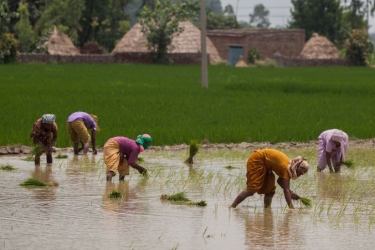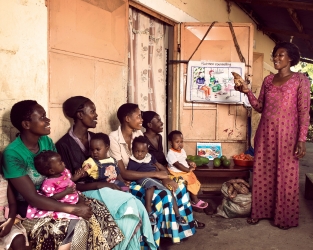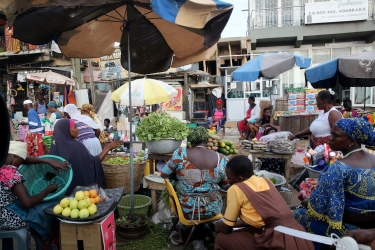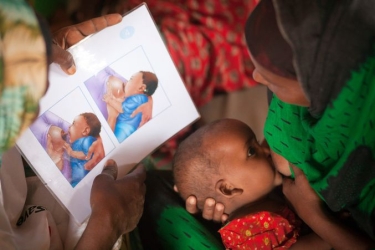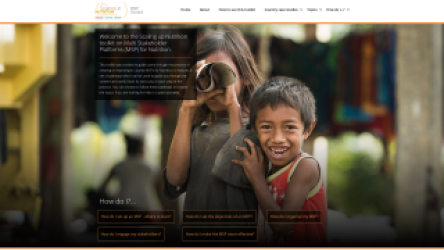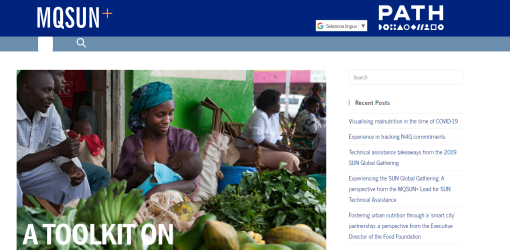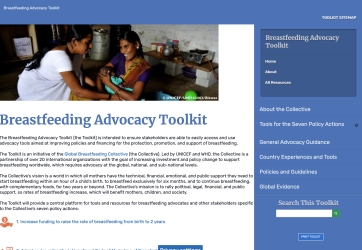Tools for nutrition action
SUN Movement members, and SUN Government Focal Points in particular, often need to make the case for nutrition action and prioritization or funding for nutrition.
The following tools can be used to guide the development of advocacy strategies and actions.
Additionally, SUN Civil Society Network (CSN) members can access tailored advocacy support from the CSN here.
Climate change is jeopardizing the food and nutrition security of people all around the world.
The most recent evidence available suggests that the number of people unable to afford a healthy diet around the world rose by 112 million to almost 3.1 billion, reflecting the impacts of rising consumer food prices during the pandemic (State of Food Security and Nutrition in the World 2022 report).
The SUN Movement has developed a digital communications toolkit on the climate-nutrition nexus, which seeks to:
- Clarify the interlinkages and interdependence between climate change and nutrition.
- Make the case for incorporating nutrition in the global climate agenda.
- Make the case for incorporating the links between nutrition and climate change into the agendas of SUN partners and stakeholders.
Access the climate-nutrition digital communications toolkit
Women and nutrition are connected in many ways. Gender inequality is both a cause and effect of malnutrition, hunger and poverty. We will not succeed in scaling up nutrition if we do not address the drivers and impacts of gender-based discrimination.
The SUN Movement has developed a digital communications toolkit on gender and nutrition, which seeks to:
- Clarify the interlinkages and interdependence between gender and nutrition.
- Amplify the initiatives that countries are carrying out to scale up gender-transformative nutrition actions
- Support countries in raising awareness on the essential links that connect nutrition, empowerment and the benefits of gender equality for all individuals, families, societies and nations
- Call on all stakeholders to integrate a gender lens as part of good nutrition, food security and the reduction of inequalities
Access the gender and nutrition toolkit here
Following the Food Systems Summit (FSS) in December 2021, the UN-Secretary General committed to convene “a global stock-taking meeting every two years to review progress in implementing the outcomes of this process and its contributions to the achievement of the 2030 Agenda.” The first of these Food Systems Stocktaking Moments (STM) will take place in Rome, Italy from 24 to 26 July 2023.
The theme of the STM is “Sustainable Food Systems for People, Planet and Prosperity: Diverse pathways in a shared journey”. The STM focuses on three objectives:
- Convene countries and stakeholders to review progress on the commitments to action that were made during the FSS;
- Socialize the powerful role of sustainable, equitable, healthy and resilient food systems as critical SDG accelerators;
- Advocate for urgent action at scale.
Each year, from 1-7 August, countries, organizations and nutrition champions celebrate World Breastfeeding Week all over the world to raise awareness around the importance of breastfeeding as a fundament of good nutrition, food security and reduction of inequalities.
The SUN Movement has developed a digital communications toolkit in support of World Breastfeeding Week, which seeks to:
- Amplify countries' breastfeeding initiatives.
- Support countries in raising awareness on the importance of breastfeeding.
- Call on all stakeholders to support breastfeeding as part of good nutrition, food security and reduction of inequalities;
- Call on governments, health workers and the baby food industry to end exploitative formula milk marketing and fully implement and abide by the Breastmilk Code requirements.
Access the World Breastfeeding Week digital communications toolkit
This toolkit was created in response to requests from SUN Countries for technical assistance on how to manage intersectoral coordination for nutrition through multi-stakeholder platforms (MSPs) for nutrition and focuses on the design of successful MSPs, with support from Nutrition International under the Technical Assistance for Nutrition (TAN) project, funded with UK aid from the UK government. It offers definitions, explanations, practical tools and guides, and examples from countries which have already undertaken aspects of MSP design. It does not provide information on multi-sectoral implementation, which is one of the main aims of many MSPs, but rather how to design an MSP to coordinate and oversee this implementation.
How it works: You can use this toolkit in two ways: follow the set of pathways aiming to guide users or browse to find the topics you are looking for in a particular area.
Access toolkit here
This toolkit was created to leverage MQSUN (+)’s experience supporting SUN countries to document and share approaches, key learnings and positive practices in multi-sectoral nutrition planning. It aims to provide guidance and associated resources for countries to carry out this process. Although this toolkit primarily draws from MQSUN+ experience in supporting multi-sectoral nutrition planning at the national level, many of these steps can be adapted to the sub-national level based on the country context. The tools and resources stem from established literature, as well as ones developed or adapted by MQSUN(+) over the course of its TA provision.
How it works: You can use this toolkit to get an overview of relevant steps within the country-led process, to find guidance on approaches and/or to identify appropriate and useful resources to support this process. The toolkit aims to guide users through each step and highlight reference documents, country examples and resource packages.
Access the toolkit here
This page lists various nutrition advocacy resources by UNICEF. In particular, the Prevention of Overweight and Obesity in Children and Adolescents Advocacy Strategy and Guidance intends to support governments and partners in upholding children's right to nutrition, with an explicit focus on ending child malnutrition in all its forms, including overweight and obesity.
This toolkit published by Global Alliance for Improved Nutrition (GAIN), Save the Children and the Youth Leaders for Nutrition in 2019 helps youth to design, develop, and implement an advocacy strategy for improving adolescent nutrition. The toolkit includes a step-by-step guide, advocacy planning checklist, briefs on nutrition issues, briefs on issues that impact nutrition, templates and forms, and additional resources.
This toolkit intends to assist the Cluster Lead Agency (CLA), UNICEF, Nutrition Cluster Coordinators, Information Management Officers, and Nutrition Cluster partners at country and global levels to develop, implement and monitor advocacy related to the cluster. The Nutrition Cluster Advocacy Toolkit is not meant as a stand-alone guide on how to carry out advocacy activities. Instead, it is a practical guide for advocacy. It provides key questions for reflection, basic advocacy pointers and some advocacy tools to support Nutrition Cluster partners through the different stages of the advocacy cycle with a specific focus on advocacy for nutrition in humanitarian contexts. Previous advocacy experiences from the Nutrition Cluster and its partner organisations are used to illustrate the different areas in which advocacy can work.
This toolkit is intended to ensure stakeholders are able to easily access and use diverse advocacy tools aimed at improving policies and financing for the protection, promotion, and support of breastfeeding.
The Toolkit is an initiative of the Global Breastfeeding Collective. Led by UNICEF and WHO, the Collective is a partnership of over 20 international organizations with the goal of increasing investment and policy change to support breastfeeding worldwide, which requires advocacy at the global, national, and sub-national levels.
This toolkit provides support to ensure that the Sustainable Development Goals (SDGs) related to nutrition are well-integrated in national development plans, policies, and strategies. This tool provides a general overview of what the SDGs are and why they are important for nutrition. It introduces the different steps that can be taken to influence government’s policies and plans and provides ready-to-use key messages.
It was developed by Action Against Hunger (ACF) in 2017 and adapted by the SUN Civil society network for use by wider civil society.
Developed in 2021, this toolkit provides resources, guidelines and examples for UNICEF’s nutrition team and communications officers at country level to adapt advocacy tools and organize events and campaigns for different audiences, focusing on stunting prevention.
This guidance note was developed to support SUN country advocacy efforts in mobilising resources for their Multi-sectoral Nutrition platforms. It is intended to support SUN Focal Points, country multi-stakeholder platforms (MSPs) and technical assistance partners in this process.
This slide deck was used by MQSUN+ to support countries in the development of an advocacy strategy for their multisectoral nutrition plan (MSNP) via an in-country advocacy workshop.
This comprehensive and practical advocacy toolkit was developed by the SUN Civil society Network. It helps to understand how to develop advocacy strategies. It is not meant to be read cover to cover but should be picked up and used as and when useful as a reference and signposting document. Each section has been kept short and snappy so that it can be read quickly and resources found in a matter of minutes. It is not a definitive and exhaustive guide but intended as a springboard with an outline of the minimum information required in order to tackle the topic.This toolkit was developed in 2014. For more recent resources on nutrition policies, see the news page of the SUN movement website
